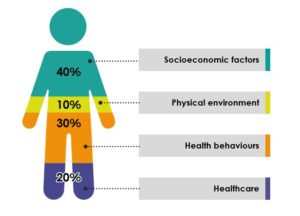People are supported to engage with and manage their health and wellbeing.
Healthy life expectancy varies significantly across Bedfordshire, Luton and Milton Keynes (BLMK). In Luton, women can expect to live a healthy life until they are 60, but just a few miles away in Central Bedfordshire they can expect to live healthily until they are 67.

We know that there are a number of factors that influence how long people can expect to live a healthy life, and these include following healthy behaviours and actively seeing to prevent disease, spotting health conditions earlier when they are less advanced and easier to treat, supporting people to manage their conditions and ensuring they have consistent access to high quality care.
We know that improvements are needed in all these areas across BLMK. For example, the number of people who are current smokers is higher in parts of our area compared to the England average. Smoking is more prevalent in people in routine/manual occupations and among people with long term mental health conditions. Milton Keynes and Bedford Borough residents are also less likely to visit the natural environment for health or exercise, when compared with the national average.
Around half of all people across BLMK are living with a long-term condition.
Three focus areas
This priority has three main areas of focus:
- Health improvement and disease prevention – supporting people individually and in their communities, including action to address the social determinants of health and inequalities in access, outcomes and quality of health and social care.
- Early detection of health conditions – supporting better understanding of the signs and symptoms of ill health, looking for opportunities to make early interventions to stop people’s health from worsening, and supporting better uptake of screening programmes.
- Optimal management of long-term conditions – giving people the information and tools that they need to manage their own health and care, where possible, and better co-ordinating care where people need help from more than one health or social care provider.
We will achieve this through:
- Ensuring that local people and communities play a significant role in their own health and wellbeing.
- Giving our partners in the voluntary, community and social enterprise organisations a more significant role in supporting our population to stay healthy.
- Spreading innovation relating to prevention, building on best practice examples both within BLMK and from other areas of the country.
- Including links to tools, services and information that can support people to stay well through our website.
- Building on our work during Covid to connect into local communities, with a focus on helping people to stay healthy and active, including maintaining a healthy weight.
- Developing the skills of our staff to deliver preventative and personalised care.
- Integrating the use of digital tools to help people to stay healthy, including support for self-management of long-term conditions.
Measuring success
We will measure our success through tracking reductions in those factors which have been linked to ill health, including overweight and obesity, smoking and alcohol consumption. And we can also look at attitudes to health behaviours across our population.
We will also measure the number of people who are getting preventable diseases, including specific respiratory and liver conditions.
We’ll measure the number of people dying from cancer, stroke and respiratory diseases which will tell us whether we’re shifting the dial on diagnosing these conditions at a stage where they are easier to manage and treat. And we’ll look for increases in understanding amongst population of the role of self-management in good health outcomes and the numbers of people who self-manage their condition. We’ll also get an understanding of how well people are able to access the help they need, by tracking the number of people who are visiting their GP or A&E department where this could have been avoided, particularly for those with long-term or mental health conditions.






